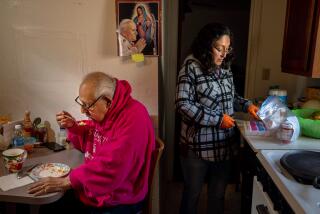Temporary Leave for Elderly Care
- Share via
Prof. Nadine Taub of Rutgers Law School (Opinion, May 25) argues persuasively in favor of legislation to guarantee employees their jobs when temporary leave is required for medical reasons or for caring for one’s newborn child.
She articulately points out that “by treating temporary incapacities of pregnancy like other temporary incapacities, the bill introduced by Rep. William Clay (D-Mo.) would eliminate a source of resentment between workers who miss work for pregnancy-related reasons and workers who miss work for equally compelling problems.”
Unfortunately, she states only as an afterthought that the care needs of the elderly will far exceed those of small children. If the idea is to recognize and accommodate the personal responsibilities that compete with one’s work, we ought to be thinking about allowing workers unpaid leave from their jobs to care for frail elderly parents.
Often times, the only thing standing in the way of a senior’s institutionalization in a nursing home is the care that is provided at home by one of their adult children. In effect, they often save taxpayers millions of dollars that Medicaid would spend on nursing home care for these people.
Although it appears that the parents of newborns come first in terms of public policy, it is obviously in the public interest to extend such leave benefits to employees caring for seniors. As long as birth, death and illnesses are part of life, caretaking applies to all age groups.
Certainly, one solution to this problem is to provide more respite care services to those caring for elderly relatives, so that they may leave their parent in capable hands on occasion while pursuing other responsibilities. Prospects for such funding, however, are not bright, considering the current budget-cutting atmosphere.
In the meantime, we can support the heroic efforts of persons caring for older parents at home by at least providing them the same leave benefits proposed for new parents.
Supporting home care in this manner is not only more cost-effective than maintaining a person in a skilled nursing facility, but it also is a more humane alternative to institutionalization.
DENNIS H. JACKSON
General Manager
City of Los Angeles
Department of Aging
More to Read
Sign up for Essential California
The most important California stories and recommendations in your inbox every morning.
You may occasionally receive promotional content from the Los Angeles Times.










